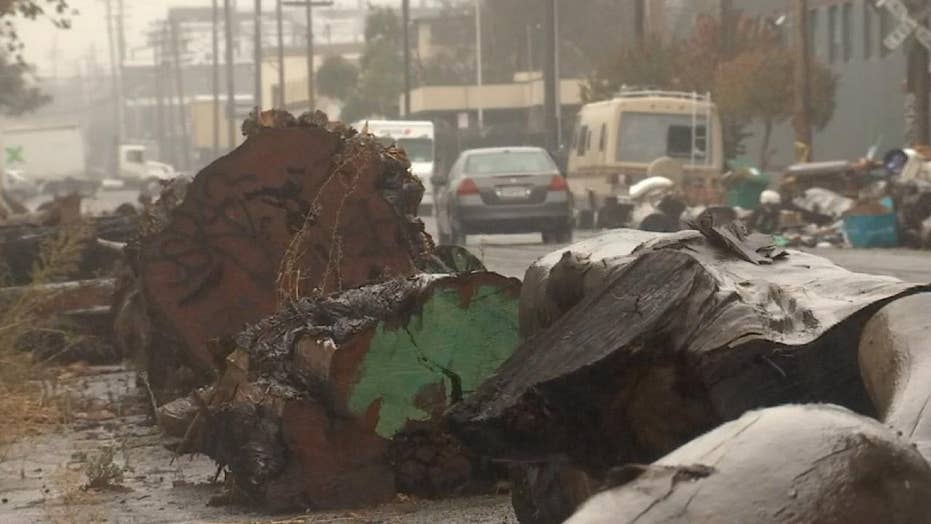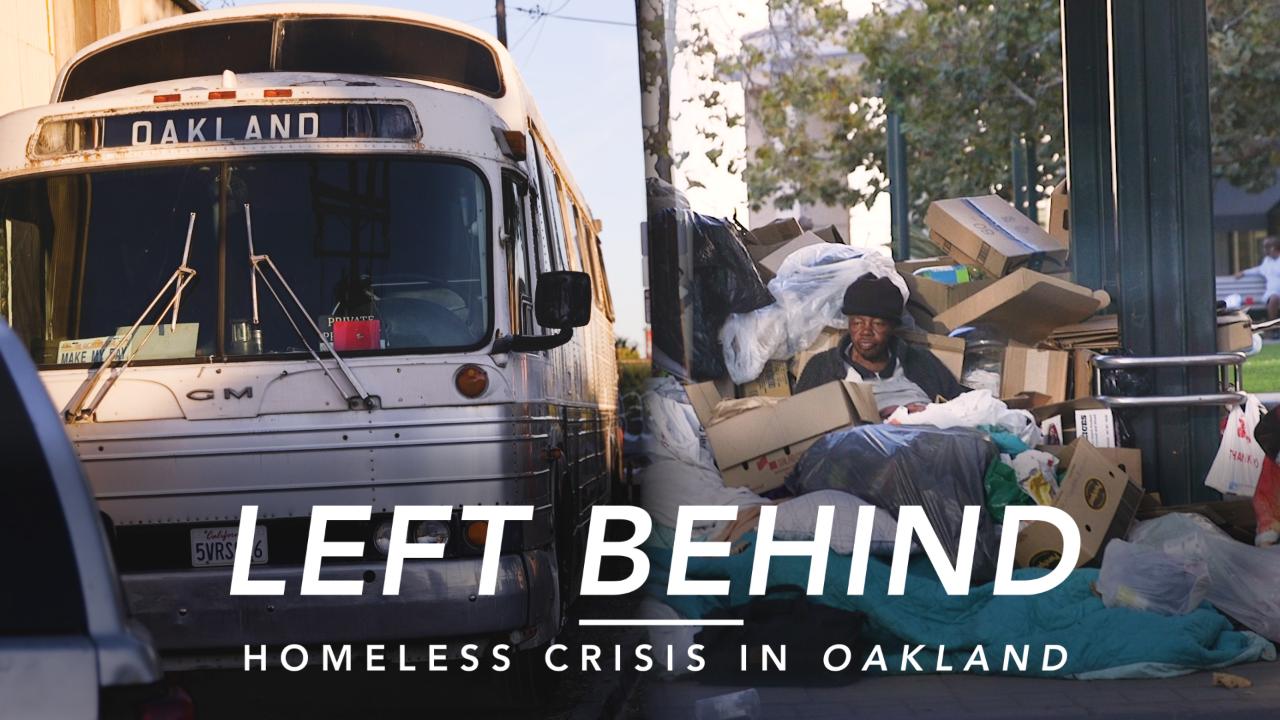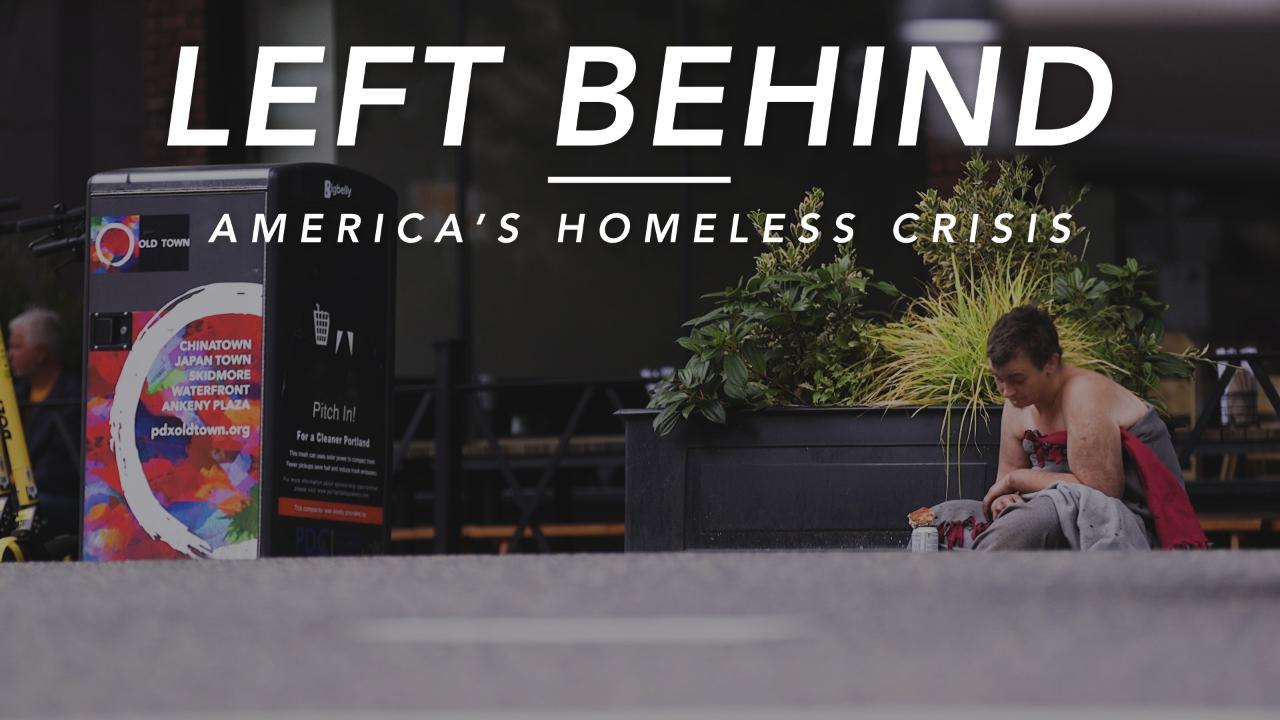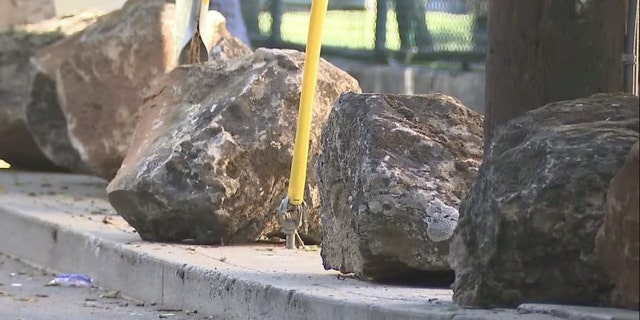Oakland's rising homelessness crisis prompts DIY effort using large logs

Logs placed on Oakland street in apparent attempt to deter homeless from parking vehicles
Large logs line a two-block stretch of road in Oakland in apparent attempt to thwart the homeless from parking their cars and RVs.
Someone in Oakland has been taking matters into their own hands by placing car-sized logs in front of businesses in an effort to deter transients from setting up camp in the California city.
While the motive is clear — to keep the homeless out — no one person or group has come forward to say they are behind the long line of logs that have been preventing the homeless from parking their RVs or dilapidated vehicles in front of businesses.
Large tree logs were placed outside Oakland, California businesses to help deter homeless residents from parking their cars outside.
(KTVU)
City officials have complained the logs have blocked crews from cleaning up the areas of Oakland but admit they have done little to root out the culprit.
Councilmember Lynette Gibson McElhaney told the East Bay Times (EBT) she's reached out to local business owners but that no one would fess up to doing it.
Sean Maher, a spokesman for Oakland's Public Works Department, said he considers the logs an "intentional obstruction of the public right of way," but admits the department has not reached out to local businesses to get to the bottom of the mystery.
Large tree logs were placed outside Oakland, California businesses to help deter homeless residents from parking their cars outside.
(KTVU)
Greg Anderson, manager at the Oakland Music Complex, told EBT that he doesn't have a problem with the logs and blames the city for not addressing the homelessness situation earlier.
"Since the city does an extremely poor job in preventing homeless encampments from developing in West Oakland, these logs that were placed out there by a neighboring company have been instrumental in minimizing these encampments," Anderson said in an email.
Left Behind: Homeless Crisis in Oakland
Fox News embarked on an ambitious project to chronicle the toll progressive policies have had on the homeless crisis in five west coast cities: Seattle, San Francisco, Los Angeles, Oakland, and Portland, Ore. In each city, we saw a lack of safety, sanitation, and civility. Residents, the homeless and advocates say they’ve lost faith in their elected officials’ ability to solve the issue. Most of the cities have thrown hundreds of millions of dollars at the problem only to watch it get worse. This is what we saw in Oakland.
But not everyone is on board with the DIY approach.
Easy Bay Community Law Center's Osha Neumann called the barricade "hostile architecture."
"If all these homeless people could turn themselves to stone, then this would not be a problem. But because they don't have that capacity they get pushed out by the real stones and boulders, which appear to be much more acceptable and aesthetically pleasing," she said.
Still, the anti-homeless backlash from business owners and residents have been on the rise in Oakland — and across the state — for quite some time.
Residents recently told Fox News they are tired of the uptick in numbers and the lethargic response by elected city officials.
Oakland saw a 47 percent jump in homelessness in two years — one of the largest surges of any California city, according to a one-night street count released in July.
Left Behind: America’s Homeless Crisis
Fox News Digital embarked on an ambitious project to chronicle the toll progressive policies have had on the homeless crisis in four west coast cities: Seattle, San Francisco, Los Angeles and Portland, Ore. In each city, we saw a lack of safety, sanitation, and civility. Residents, the homeless and advocates say they’ve lost faith in their elected officials’ ability to solve the issue. Most of the cities have thrown hundreds of millions of dollars at the problem only to watch it get worse. This is what we found.
The count, which used federal guidelines, showed Oakland had 4,017 homeless people in 2019, up from 2,761 in 2017. The increase puts the city's per capita homeless rate higher than neighboring San Francisco and Berkeley and comes at a time when several West Coast cities are struggling with a homeless crisis that's been driven by rising rents, drug addiction, mental illness and pushback from progressives.
The Point-In-Time Count also found that the number of people living in their vehicles had more than doubled, skyrocketing 131 percent. At the beginning of the year, there were 1,430 people living in their vehicles, up from 618 in 2017. Roughly half called their cars and vans home while the others sought shelter in recreational vehicles.
The jump in stats has led to unconventional suggestions by fed-up Oaklanders like Gene Gorelik, who suggested the homeless should be put on a party bus stocked with alcohol, driven over the border and left stranded in Mexico. At one point, Gorelik tried to bribe the homeless to leave but was eventually shouted down by homeless advocates.
The mystery logs in Oakland come two months after residents in neighboring San Francisco placed large boulders to keep the homeless off their sidewalks.
A group of neighbors in San Francisco had two dozen boulders placed along a residential road to deter people from camping out. They have since been removed.
(KTVU)
In Ingleside, frustrated residents erected a plywood wall on a narrow pedestrian pathway to keep away transients who used the ally outside people's homes as a toilet. The nights it wasn't used as a bathroom, the area became base camp for illegal drug dealing, neighbors told Fox News during a visit in November.
Caltrans (the State of California, Department of Transportation) has also been considering whether to put boulders or some other type of barrier to deter encampments in West Berkeley, where the homeless have made underpasses and train tracks their homes. Twice a month, Caltrans cleans the encampments, forcing dwellers to briefly leave but then allowing them back in once the sites are cleaned.
Source: Read Full Article





